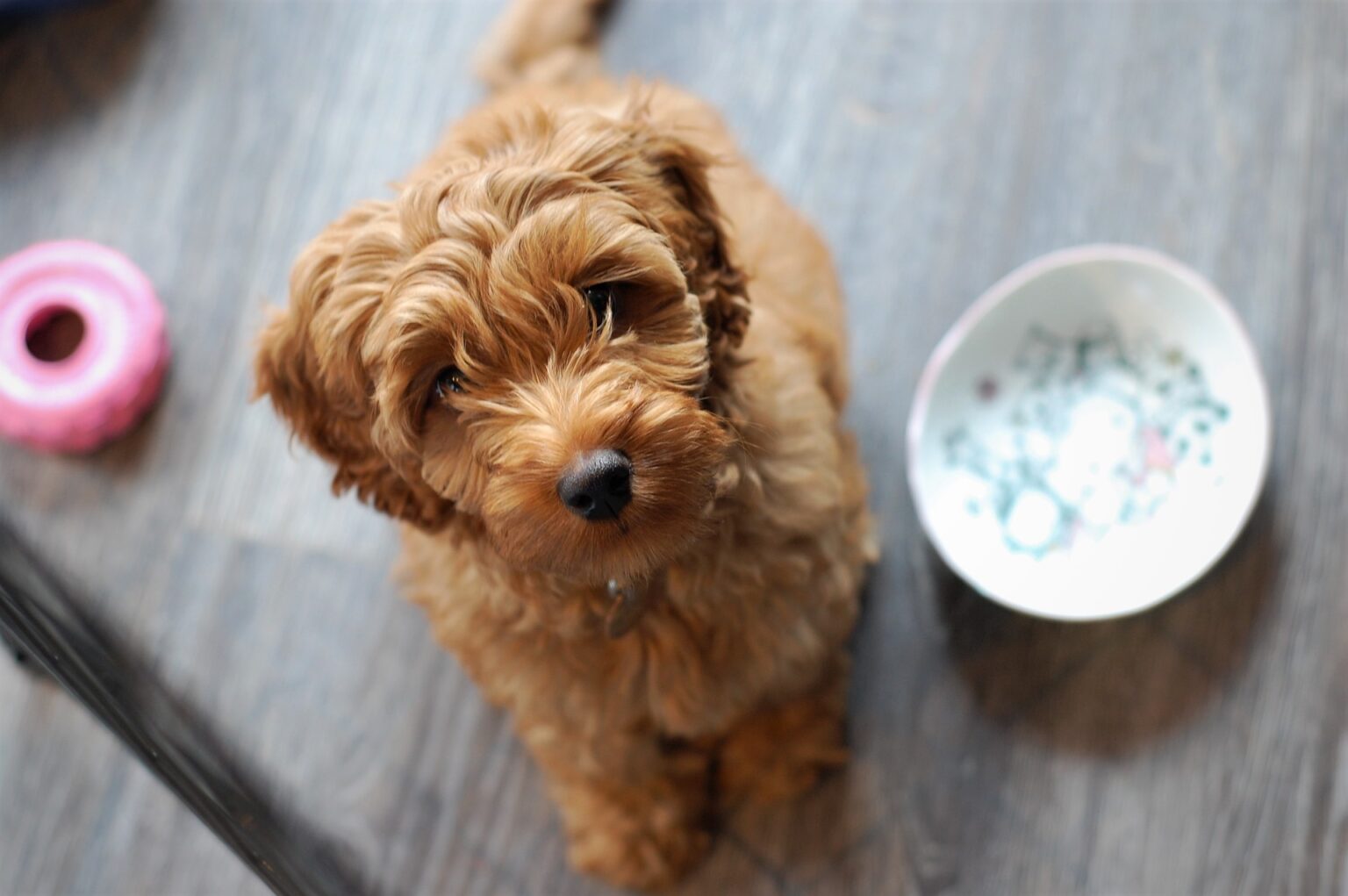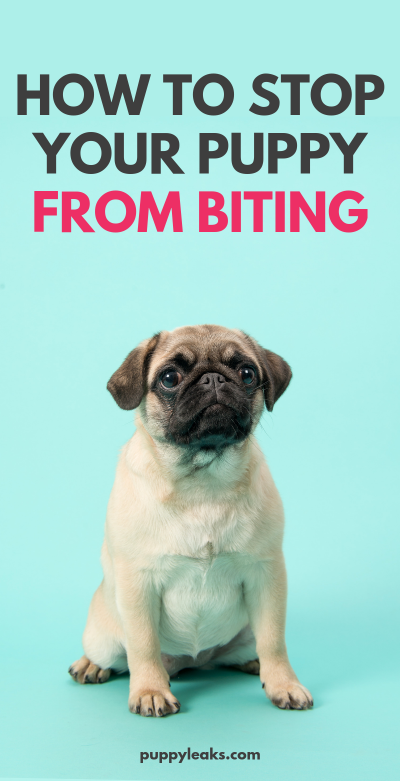3 Simple Ways To Stop Your Puppy From Biting
If you’ve recently adopted a puppy one of the first things you’re going to ask yourself is “why is he biting so much?” Well either that or what in the hell have I gotten myself into.
Training your puppy to stop biting is not a fun or quick process. I’m not going to sugarcoat it; it takes a lot of patience and consistency, and some dogs take longer to train than others. But don’t worry — there is hope.
These methods work by encouraging your dog to chew on something appropriate, rather than using your limbs as a chew toy. Here’s 3 methods to stop your puppy from biting.
Puppies Are Jerks — That’s Why They’re So Cute
If you have a puppy chances are you’re asking yourself “what in the world have I gotten myself into?” Trust me, you’re not alone. Puppies are a handful, and their constant biting can be extremely frustrating.
Why do puppies bite so much anyway? Puppies are just like babies in a few ways; they’re curious, they can be fussy, and they’re just starting to learn about the world around them. And guess what they use to explore this new world? Yep, those sharp little teeth of theirs.
Sure their litter mates and mom taught them a few things, but now it’s up to you to continue the process. And that includes teaching them not to bite humans.
Puppies bite everything, and they bite a lot, and some breeds tend to bite more than others. It’s their way of exploring and learning about the people and things that surround them. While it might be funny for a minute it gets old pretty quick, especially if you’re the one on the receiving end.
Teaching your puppy not to bite is one of the first things you’re going to want to work on, especially if you have children.
Training a puppy isn’t on my list of fun and enjoyable activities; it’s a lot of hard work and as I said puppies are jerks. There’s a reason they’re so cute and that sole reason is to keep us from harming them. It doesn’t take long for the cuteness of a puppy to wear off as you find yourself constantly prying their mouth off of everything.
Bite Inhibition: Learning to Fill In The Gaps
One of the first things your new puppy needs to learn is how to how to control that mouth of his. And to do that you’re going to have to start teaching them some bite inhibition.
Bite inhibition is a learned response where your dog consciously inhibits the force of his bite. Dogs start learning this behavior at a young age from their litter mates, but now you have to fill in the gaps.
Your puppy probably has a decent foundation of this behavior. While pups are nursing the mother dog will stand up and walk away if one of the pups bites too hard. When puppies are playing with their siblings they’ll yelp and stop playing if someone gets too rough. But problems can arise when the pup is introduced to his new human family and those same boundaries aren’t set and reinforced.
The good news is that this biting behavior isn’t permanent, the bad news is that it’s not always easy to train them out of their biting behavior (not to mention how much those puppy teeth hurt). As with us humans, each dog is different, and some dogs will require more consistency to break this nasty habit.
Three Ways To Stop Your Puppy From Biting
I’m not going to sugar coat this — teaching your puppy not to bite takes awhile. Most dogs aren’t going to catch on in one day and be done with it. And you better make sure your whole family is on board with the training process.
Don’t let dad rough house with your pup & then expect him to calm down & be on his best behavior immediately afterwards. Teaching your puppy not to bite takes consistency and patience from everyone involved.
Here’s the three methods that work best when training your new puppy not to bite.
1. Redirect Your Puppies Bites to Another Object
The redirection method is great when it comes to teaching your puppy to stop biting, but it does take consistency.
Puppies bite whatever is in front of them, and if it’s a moving target it’s even more exciting. So when your puppy bites your hand and you pull away they might take that as a game and decide to keep chasing after those yummy fingers of yours. The redirection method works by teaching them that there’s way more exciting things to chew on than your flesh.
The process is pretty simple, but as I mentioned above — consistency is key. Every time your puppy goes to bite your hands or pant legs redirect their attention to another object. The redirection method goes like this:
- When your dog bites you give them a toy instead. Move it around, make noises; do whatever you have to do to make that toy more exciting than biting you.
- If your puppy won’t take the toy ignore them.
- And by ignore them I mean be still because puppies like to chase stuff that moves — including your pant legs
Now I know it sounds fairly simple, but resisting that urge to pull away quickly is tough. But those quick actions tend to get puppies even more riled up and excited, which leads to even more biting.
For my dog Laika, aka the biting monster, we had a lot of success with the redirection method. Anytime she would get too rough and bite too hard I would grab a toy and encourage her to play with that instead. If she continued to try to go after my skin with those sharp teeth I would just stop playing altogether.
Now when it comes to stopping the play you need to make sure what you’re actually doing is becoming boring & dull. Your first instinct might be to walk away from the dog when they’re getting too rowdy. But that can make things worse since moving objects are always going to be more interesting to a puppy than something still.
This process took a long time for us, mostly because training myself to stay still & calm while getting bitten by a puppy was difficult. Eventually I caught on, and that calmness kept my dog from going full on puppy assault mode. And by staying calm I was able to discourage her from biting me further.
Every time she’d bite my hand I’d pull out a toy and encourage her to play with that instead. Eventually she started bringing toys to me when she was in a feisty mood, rather than grabbing onto my legs from the get go.
Tip: If you’re looking for a good toy your puppy can’t chew up in seconds check out our top 5 tough dog toy recommendations. Since your puppy is likely teething a good chew toy or two can help ease that discomfort as their adult teeth come in.
My personal favorite for toy puppies is the Chuck It Glow Ball; it’s lightweight and great for fetch, and through some sort of magic holds up extremely well to chewing, despite my dog’s best efforts.
2. Socialization Will Help Stop Your Puppy From Biting
Another way to stop your puppy from biting everything is by socializing them more. Sign them up for puppy kindergarten or doggy daycare for awhile. Not only will you be getting your dog the proper socialization he needs, but he’ll be picking up on lots of good doggie manners in the process, including better bite inhibition.
They’ll be learning from other dogs that playing too rough isn’t tolerated, and that biting too much puts a time out to play time.
This is one of the reasons why removing a pup from their litter before 8 weeks old is considered a big no no — that extra time with their littermates gives them a good foundation of bite inhibition to start with.
Research has found that puppies who are separated from the litter too early are more likely to show fear, aggression, anxiety, resource guarding, reactivity and inappropriate play biting than puppies who stay with the litter for at least eight weeks. – Cornell University
If you’re not going to puppy kindergarten try to continue to introduce your new puppy to other dogs in other situations. Socialization is often overlooked when it comes to training, but it’s one of the first things you should work on. Studies have shown that dogs who don’t receive proper socialization are more likely to have behavioral problems later on.
Studies like this indicate that it’s never too early to begin socialization and why dogs who don’t get sufficient human contact as puppies tend to be the most difficult to break of their fear of people later in life. – Animal Behavior College
Not only is socialization necessary for their social development – it makes bite inhibition training much easier. Having your puppy learn from adult dogs is something you should take advantage of. Back before we domesticated them they were pack animals, so they’re pretty good at learning from their peers.
You’re still going to work on training bite inhibition at home, but socializing with other dogs can be invaluable when it comes to making the process much easier.
Tip: If you’re not able to sign up for a puppy class invite your friends or neighbors well behaved dogs over for some play dates.
3. Clicker Train Your Pup for Better Impulse Control
Clicker training is a good thing to teach your pup because it enables you to mark good behaviors in a consistent way. The clicker sound itself is used as a cue that your dog did something right. By using a sound cue you’re able to capture the exact moment he makes that good decision
So when you put your hand in front of your puppy & he doesn’t bite you’re going to click & give a treat. Part of learning bite inhibition is having your dog learn exactly what the boundaries are. Since clicker training allows for more precision it works really well for teaching bite inhibition.
How to Teach Bite Inhibition With a Clicker
- Place your hand in front of your pup’s mouth, if he doesn’t bite give him a click, treat, and praise like crazy.
- When you’re comfortable that your pup isn’t going to bite your hand when you place it in front of his face you can up the ante.
- Start by slowly waving your hand in front of him, if he doesn’t bite it praise, click and treat.
Your goal here is to teach your puppy not to bite everything that comes near his face. Don’t set him up to fail. Start slowly, his first reaction might very well be to bite anything that comes near him.
Click and treat for small inhibitions and gradually up the stimuli. If you’re consistent you should end up with a puppy that isn’t going to reach out and try to bite anything that moves.
Just remember this activity will take a lot of practice. You’re building up his impulse control which isn’t something that can be trained in just a few sessions. Puppies need to learn boundaries and how to control their impulses just as children do. They need to learn that good things come to those that wait, or in this case good things come to puppies that don’t bite.
Once your dog has a good foundation with their bite inhibition you can move onto more challenging games such as tug of war, which will teach your dog how to control that mouth of theirs.
Should You Yelp When Your Puppy Bites You?
There are so many articles out there that tell you to yelp at your puppy when he bites you because it’ll make them stop. The theory is that your yelp is a clear signal to your puppy that he hurt you. Now maybe my yelps weren’t convincing enough but this method did not work at all with my dog. In fact it made her much worse.
The yelping method doesn’t work for all dogs. I still remember the first time I tried this with my puppy years ago – it made her come at me twice as hard. Many dogs become over stimulated by this strategy and it can make their biting worse. So please use with caution.
Teaching Bite Inhibition Takes Patience
Teaching bite inhibition was a real pain for me. It actually took a lot of time with both redirection and clicker training for it to finally start working. Don’t be completely discouraged if your pup is a bitey jerk, it’s just the way puppies are. Their one defense is their teeth so they’re going to use ’em.
If you praise enough when they’re behaving well and ignore them when they play rough they’ll start to catch on. They’ll start to understand the proper way to interact with their new human family; one that doesn’t involve those sharp puppy teeth.
Here’s a great video from Applause Your Paws on how to stop a puppy from biting –
Did Your Puppy Bite Like Crazy?
Did your puppy bite like crazy? How long did it take for you to train your puppy not to bite? Did you use the redirection method? Did the yelping method work for you?


